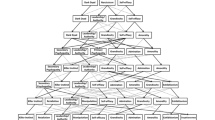Abstract
This introduction to the topical collection, Folk Psychology: Pluralistic Approaches reviews the origins and basic theoretical tenets of the framework of pluralistic folk psychology. It places special emphasis on pluralism about the variety folk psychological strategies that underlie behavioral prediction and explanation beyond belief-desire attribution, and on the diverse range of social goals that folk psychological reasoning supports beyond prediction and explanation. Pluralism is not presented as a single theory or model of social cognition, but rather as a big-tent research program encompassing both revisionary and more traditionally inspired approaches to folk psychology. After reviewing the origins of pluralistic folk psychology, the papers in the current issue are introduced. These papers fall into three thematic clusters: Folk-psychological strategies beyond propositional attitude attribution (Section 2.1); Enculturation and regulative folk psychology (Section 2.2); and Defenses of pluralism (Section 2.3).
Similar content being viewed by others
Notes
Importantly, Zawidzki makes it clear that his account aims to explain how we use person-level, linguistically expressible folk psychological concepts. He distinguishes these from sub-personal, implicit forms of mentalizing (Butterfill and Apperly 2013; Zawidzki 2011), which he thinks do serve predictive rather than regulative functions.
References
Andrews, K. (2008). It’s in your nature: A pluralistic folk psychology. Synthese, 165(1), 13–29. https://doi.org/10.1007/s11229-007-9230-5.
Andrews, K. (2012). Do apes read minds?: Toward a new folk psychology. Cambridge: MIT Press.
Andrews, K. (2015). The folk psychological spiral: Explanation, regulation, and language. The Southern Journal of Philosophy, 53, 50–67. https://doi.org/10.1111/sjp.12121.
Baillargeon, R., Scott, R. M., & He, Z. (2010). False-belief understanding in infants. In Trends in cognitive sciences (Vol. 14, Issue 3, pp. 110–118). NIH Public Access. https://doi.org/10.1016/j.tics.2009.12.006.
Butterfill, S. A., & Apperly, I. A. (2013). How to construct a minimal theory of mind. Mind & Language, 28(5), 606–637.
Carruthers, P., & Smith, P. K. (1996). Theories of theories of mind. Cambridge: Cambridge University Press.
Fiebich, A., & Coltheart, M. (2015). Various ways to understand other minds: Towards a pluralistic approach to the explanation of social understanding. Mind and Language, 30(3), 235–258. https://doi.org/10.1111/mila.12079.
Fiebich, A., Gallagher, S., & Hutto, D. D. (2016). Pluralism, interaction, and the ontogeny of social cognition. In J. Kiverstein (Ed.), The Routledge handbook of philosophy of the social mind (pp. 208–221). London: Routledge
Fricker, M. (2007). Epistemic injustice: Power and the ethics of knowing. Oxford: Oxford University Press.
Gallagher, S. (2015). The new hybrids: Continuing debates on social perception. Consciousness and Cognition, 36, 452–465.
Giere, R. N. (1996). The scientist as adult. Philosophy of Science, 63(4), 538–541.
Godfrey-Smith, P. (2005). Folk psychology as a model. Philosophers’ Imprint, 5(6), 1–16. https://doi.org/10.3366/jqs.2011.0012.
Goldman, A. I. (2006). Simulating minds: The philosophy, psychology, and neuroscience of mindreading. Oxford University Press.
Gopnik, A., & Wellman, H. M. (1992). Why the child’s theory of mind really is a theory. Mind and Language, 7(1–2), 145–171. https://doi.org/10.1111/j.1468-0017.1992.tb00202.x.
Hursthouse, R. (1991). Arational actions. The Journal of Philosophy, 88(2), 57–68.
Hutto, D. D. (2004). The limits of spectatorial folk psychology. Mind and Language, 19(5), 548–573. https://doi.org/10.1111/j.0268-1064.2004.00272.x.
Kim, J. (2006). Philosophy of mind. Boulder: Westview Press.
Maibom, H. L. (2003). The mindreader and the scientist. Mind and Language, 18(3), 296–315. https://doi.org/10.1111/1468-0017.00229.
Maibom, H. L. (2007). Social systems. Philosophical Psychology, 20(5), 557–578. https://doi.org/10.1080/09515080701545981.
Mameli, M. (2001). Mindreading, mindshaping, and evolution. Biology and Philosophy, 16(5), 597–628. https://doi.org/10.1023/A:1012203830990.
McGeer, V. (2007). The regulative dimension of folk psychology. In D. D. Hutto & M. Ratcliffe (Eds.), Folk psychology re-assessed (pp. 137–156). Berlin: Springer.
Menary, R. (2012). Cognitive practices and cognitive character. Philosophical Explorations, 15(2), 147–164.
Nichols, S., & Stich, S. P. (2003). Mindreading: An integrated account of pretence, self-awareness, and understanding other minds. Oxford: Oxford University Press.
Proust, J. (2013). The philosophy of metacognition: Mental agency and self-awareness. Oxford: Oxford University Press.
Spaulding, S. (2018). How we understand others: Philosophy and social cognition. London: Routledge.
Stich, S., & Nichols, S. (1995). Second thoughts on simulation. In M. Davies & T. Stone (Eds.), Mental simulation: Evaluations and applications (pp. 87–108). Oxford: Basil Blackwell.
Stueber, K. (2010). Rediscovering empathy: Agency, folk psychology, and the human sciences. Cambridge: MIT Press.
Tomasello, M. (2018). How children come to understand false beliefs: A shared intentionality account. Proceedings of the National Academy of Sciences of the United States of America, 115(34), 8491–8498. https://doi.org/10.1073/pnas.1804761115.
van Frassen, B. (1980). The scientific image. Oxford: Clarendon Press.
Wellman, H. M., Cross, D., & Watson, J. (2001). Meta-analysis of theory-of-mind development: The truth about false belief. Child Development, 72(3), 655–684.
Westra, E. (2018). Character and theory of mind: An integrative approach. Philosophical Studies, 175(5), 1217–1241. https://doi.org/10.1007/s11098-017-0908-3.
Westra, E. (2019a). Getting to know you: Accuracy and error in judgments of character. Mind & Language. https://doi.org/10.1111/mila.12258.
Westra, E. (2019b). Stereotypes, theory of mind, and the action–prediction hierarchy. Synthese, 196(7), 1–26. https://doi.org/10.1007/s11229-017-1575-9.
Wimmer, H., & Perner, J. (1983). Beliefs about beliefs: Representation and constraining function of wrong beliefs in young children’s understanding of deception. Cognition, 13(1), 103–128. https://doi.org/10.1016/0010-0277(83)90004-5.
Zawidzki, T. W. (2011). How to interpret infant socio-cognitive competence. Review of Philosophy and Psychology, 2(3), 483.
Zawidzki, T. W. (2013). Mindshaping: A new framework for understanding human social cognition. Cambridge: MIT Press.
Acknowledgements
We are extremely grateful to all the authors who contributed papers to this special issue, and to all of the reviewers who refereed submissions. We also thank Tad Zawidzki and Heidi Maibom for their comments on this introduction, and the editors of this journal for their guidance and administrative support. KA was supported by SSHRC Insight Grant 435-2016-1051 and by the York University Research Chair Program. EW was supported by SSHRC Postdoctoral Fellowship 756-2018-0012.
Author information
Authors and Affiliations
Corresponding author
Additional information
Dedicated to Ron Giere (1938–2020), who forged the path.
Publisher's Note
Springer Nature remains neutral with regard to jurisdictional claims in published maps and institutional affiliations.
Rights and permissions
About this article
Cite this article
Andrews, K., Spaulding, S. & Westra, E. Introduction to Folk Psychology: Pluralistic Approaches. Synthese 199, 1685–1700 (2021). https://doi.org/10.1007/s11229-020-02837-3
Received:
Accepted:
Published:
Issue Date:
DOI: https://doi.org/10.1007/s11229-020-02837-3




